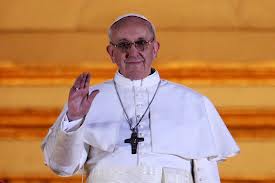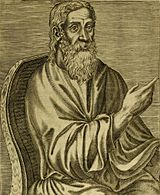 Almost every article I have read about the new Pope Francis mentions his humility, the simplicity of his home, his dedication to serving the poor and the fact that he cooks for himself.
Almost every article I have read about the new Pope Francis mentions his humility, the simplicity of his home, his dedication to serving the poor and the fact that he cooks for himself.
This led me to wonder what he eats.
According to an article in the Argentinian newspaper La Nacion in 2009, he chooses healthy frugal food and occasionally drinks a glass of wine. He is said to like fruit, skinless chicken and salads. When in Buenos Aires, he apparently never ate out in restaurants. He would eat by himself and would not even join meals at parish churches in his diocese. On the rarest of occasions, he might break from his routine of eating in his own quarters to visit a nunnery to enjoy bagna cauda – a fondue of anchovies, garlic and olive oil.
The simplicity of Pope Francis’ diet reminds me of the story of Daniel and his friends in the Christian Bible (Daniel 1).
King Nebuchadnezzar of Babylonia attacked Jerusalem and surrounded the city. He captured King Jehoiakim and seized treasures from the Temple.
 Nebuchadnezzar then ordered his chief official, Ashpenaz, to select some young men from the noble and royal families of the Israelite exiles to serve in his court. They had to be handsome, intelligent, well-trained, quick to learn, and free from physical defects. Ashpenaz was to teach them to read and write the Babylonian language. The king also gave orders that every day they were to be given the same food and wine as the members of the royal court. After three years of this training they were to appear before the king. Among those chosen were Daniel, Hananiah, Mishael, and Azariah, all of whom were from the tribe of Judah. The chief official gave them new names: Belteshazzar, Shadrach, Meshach, and Abednego.
Nebuchadnezzar then ordered his chief official, Ashpenaz, to select some young men from the noble and royal families of the Israelite exiles to serve in his court. They had to be handsome, intelligent, well-trained, quick to learn, and free from physical defects. Ashpenaz was to teach them to read and write the Babylonian language. The king also gave orders that every day they were to be given the same food and wine as the members of the royal court. After three years of this training they were to appear before the king. Among those chosen were Daniel, Hananiah, Mishael, and Azariah, all of whom were from the tribe of Judah. The chief official gave them new names: Belteshazzar, Shadrach, Meshach, and Abednego.
Daniel made up his mind not to let himself become ritually unclean by eating the food and drinking the wine of the royal court, so he asked Ashpenaz to help him. Ashpenaz was sympathetic to Daniel but was afraid of the king. So he said to Daniel, “The king has decided what you are to eat and drink, and if you don’t look as fit as the other young men, he may kill me.”
So Daniel went to the guard whom Ashpenaz had placed in charge of him and his three friends. “Test us for ten days,” he said. “Give us vegetables to eat and water to drink. Then compare us with the young men who are eating the food of the royal court, and base your decision on how we look.”
He agreed to let them try it for ten days. When the time was up, they looked healthier and stronger than all those who had been eating the royal food. So from then on the guard let them continue to eat vegetables instead of what the king provided.
God gave the four young men knowledge and skill in literature and philosophy. In addition, he gave Daniel skill in interpreting visions and dreams.
At the end of the three years set by the king, Ashpenaz took all the young men to Nebuchadnezzar. The king talked with them all, and Daniel, Hananiah, Mishael, and Azariah impressed him more than any of the others. So they became members of the king’s court. No matter what question the king asked or what problem he raised, these four knew ten times more than any fortune teller or magician in his whole kingdom. Daniel remained at the royal court until Cyrus, the emperor of Persia, conquered Babylonia.
Daniel was not alone in his experience with food. Mystics of all traditions teach that diet influences spiritual awareness.
Many spiritual masters of the East, including Hindus, and various schools of yoga, divide foods into three basic categories: Sattvic (pure), Rajasic (kingly), and Tamasic (impure). They teach that this last category of foods, which includes all flesh foods and eggs, is to be completely avoided. A sattvic diet consists of fresh, simple foods including: grains, beans, vegetables, fruits, seeds, nuts, and dairy. Sattvic foods are said to promote mental clarity, relaxation, meditation, and spiritual experience including inner visions. A rajasic diet includes very rich, spicy food, and a tamasic diet includes meat and alcohol. These are said to stimulate passions, promote mental agitation, and have an adverse effect upon concentration in meditation.
Those who take up the practices concerning the lower centres in the body, do take meat … but those who are anxious to rise above body consciousness and go into the Beyond have of necessity to eschew all that. This is the Path I have put before you. Liberation or salvation is something which starts only when you rise above body consciousness. For that reason, vegetarianism is the first essential.
(Kirpal Singh, The Night is a Jungle, published by Sant Bani Ashram of New Hampshire).
Guru Kabir, a great Master from Northern India, loved by Sufis, Sikhs, Jains, and Hindus alike, said:
The man who eats meat is a demon in human form. Keep away from him – his company will ruin your meditation.
(Kabir: the Weaver of God’s Name, Radha Soami Satsang Beas).
According to these teachers, the bad karma and other negative effects of flesh-eating apparently to some degree darkens one’s inner vision, interfering with the quality of one’s meditation, making it more difficult to reach the required deep levels of tranquility, clarity and concentration.
The concept of diet affecting spiritual awareness is not confined to Eastern mystics.
Many early Christians were vegetarian; also Clement of Alexandria, Origen, John Chrysostom, and Basil the Great. In some early church writings, Matthew, Peter and James (brother of Jesus and first leader of the Aramaic-speaking Jerusalem Church) were said to be vegetarian. According to the historian Eusebius, the Apostle “Matthew partook of seeds, nuts and vegetables, without flesh.” Many monasteries in ancient times practised vegetarianism and continue to do so.
It is far better to be happy than to have your bodies act as graveyards for animals.
Modern day Seventh Day Adventists, for example, advocate a vegetarian diet.
Most conventional world religions in the West condone flesh-eating, but many esoteric traditions which have practised various forms of mysticism, are consistent in their agreement about the need for contemplative mystics to abstain from the flesh. The list of Western vegetarian paths includes: the Pythagoreans, followers of the Hermetic philosophy of Egypt, the Sethians, Theraputae, Essenes, the original Jewish Christians called Ebionites, the Gnostic religions, Manichaeans, some Catholic monasteries, some monasteries associated with the Orthodox Church – including the great mystery school on Mount Athos in Greece – and the Sufi mystics of Islam.
It may be no coincidence that the predominantly plant-based diet of Daniel and spiritual masters of many traditions, is virtually identical to that advocated by modern science. A diet which is believed to enhance spiritual openness also protects against cancer, heart-disease, stroke, diabetes, dementia, arthritis and the general ravages of aging.
Pope Francis’s simple diet may not only have helped to deepen his spiritual practice but also given him the physical strength to take on this monumental role at the age of 76. May he prove to be as wise, knowledgeable and visionary as Daniel.
If you have enjoyed this post and would like to know more about how to cook and eat to maintain or restore your health, please sign up for free email updates.
You can also stay in touch by joining me on Facebook and Twitter.


